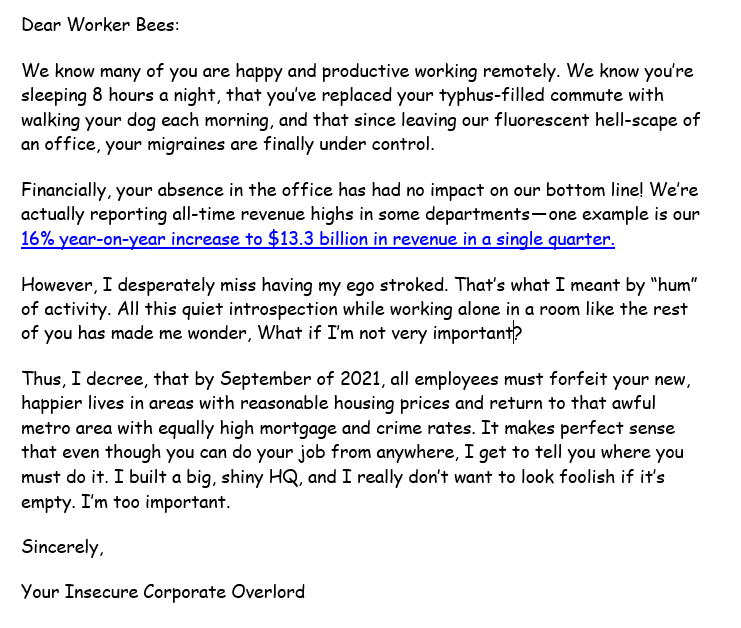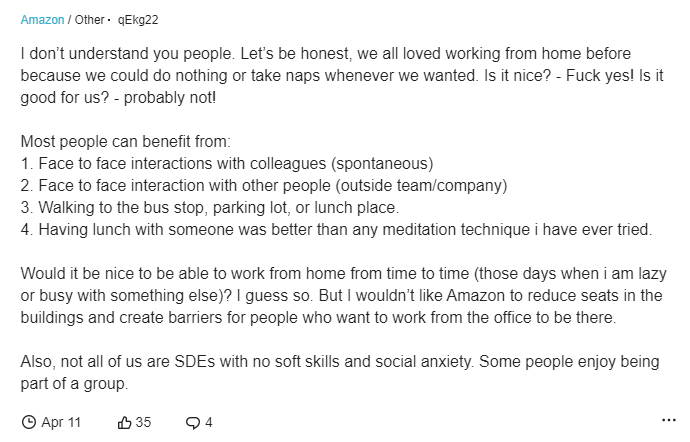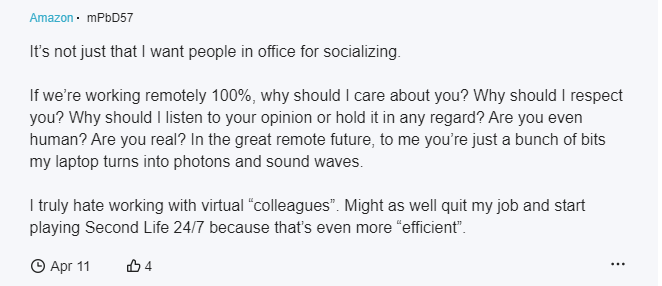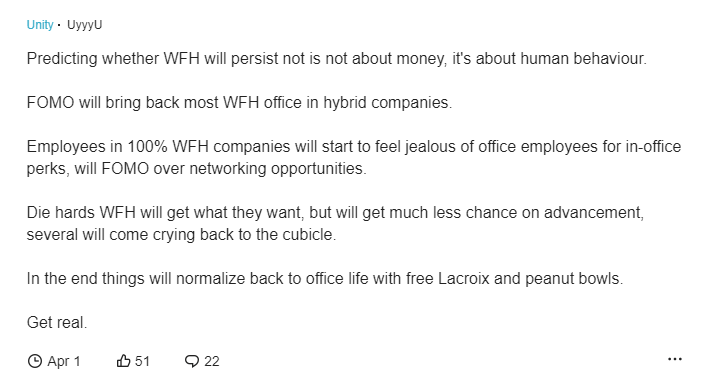Anonymous social media site Blind shows the real reasons CEOs like Tim Cook want workers back in the office post-pandemic

Tim Cook wants Apple workers back at the office.
He and many other insecure executives who initially praised remote work now miss the “hum” of activity. He elaborated in a letter to his staff. I’ve paraphrased his message below, with some poetic license.

** Source: Satirical translation of Tim Cook’s email to Apple employees, written by Author. Read Actual Letter Here.
Sadly, Tim Cook isn’t alone in his neuroses.
Other insecure managers just like him have been posting their opinions on remote work using the website Blind, a social media site where tech professionals go to anonymously bitch about one another. (You must have a valid tech company email in order to join in.)
I signed up for an account and combed through posts searching for the answer to the question, Why do some people want to go back to the office? Is it really just their ego?
After my analysis, the answer was clear: According to Blind, there are actually EIGHT legitimate reasons why your insecure manager needs you back in the office.
Because His Wife Keeps Fighting Him 🔗

An anonymous employee at Sony, who prefers the pseudonym Boners, really wants to go back to the office. He has nowhere else to go — Boners’ wife wants him out of their house. It is the only way that “conflict will reduce.”
Boners assumes you subscribe to the same sort of chauvinism as he does, and that you also have a wife at home who can’t stand you. For your own good, Boners needs you back in the office as soon as possible. Obviously, it’s the only way your children will “develop normally.”
Because He’s Having a Severe Episode of Depression You’re Somehow Responsible For 🔗

You know what gives me severe episodes of depression? Bay Area Rapid Transit. You know what else? Meetings where I have to wear pants. Furthermore, I need a whole bottle of Zoloft every time I think about all the money I spent on makeup attending pre-pandemic meetings in person.
Those things make me very depressed. Are any of them your problem to solve, Mxng40H from Snap?
No, because it isn’t your job to solve my personal problems. Similarly, I don’t get paid to be your friend or your psychiatrist. I might toss you a beer or a crisis hotline number, but the idea that I need to be in the office to cater to your social well-being is absurd.
Please make some friends, Mxng40H. Even if you get your wish and we return to the office, your having other friends will be a very good thing for us all.
Because “Soft Skills” 🔗

This Amazon employee starts by smugly bragging about naps and ends by throwing shade at all the technical worker bees who supposedly have no “soft skills” and lots of social anxiety.
As far as I know, “soft skills” are those essential, intangible skills needed to schmooze clients over lunch, like ordering off a menu and pouring.
An engineering degree takes years — developing your soft skills takes a couple appetizers and a glass of wine.
Evidently, this person’s “soft skills” aren’t being appreciated enough at home. They want to be part of a group, in a building, with a captive audience forced to praise them. They aren’t a socially anxious pile of dogshit like you, who developed actual skills and now believe you’re entitled to use them at home where this all-star can’t use theirs.
Because Nothing Impactful Was Ever Built by Dull, Antisocial Nerds 🔗

This Google employee knows the secret — the code isn’t what’s really important. We’ve had it backwards! The real secret sauce is all that inane chatter and invaluable crosstalk in the open office floor plan.
This viewpoint comes from the type of idiotic manager who schedules weekly happy hours and intrusive “social events” in order to monopolize the few free hours their employees might have left to spend with their loved ones.
They do this because they’re bored and unfulfilled with a weird vendetta against “dull, antisocial nerds.” According to this joker, such hardworking folks “rarely make things of lasting impact.”
Did you hear that, Zuck and Bill? All that time you spent writing code was wasted — the real work happens down at the bar on Polk street, with Mike from Marketing, who has no real skills to speak of besides taking shots.
Because He Has a Phobia of Miniature Villages 🔗

Little villages are adorable, and this Amazon employee is not.
It’s fine that this guy loves people, but he shouldn’t tell such bold-faced lies — plenty of great feats were accomplished in social isolation, including Shakespeare’s plays, Sir Isaac Newton’s greatest discoveries, and my laundry.
Because If They Can’t See You, You Stop Being Real 🔗

Every once in a while, a sociopath will accidentally out themselves by saying something which shows how they really view their fellow humans — as a supply of energy.
“Why should I care about you?” the sociopath says. “Why should I respect you?” The implication is that if this person can’t get something extra from you, even just social energy, they can’t see the point of acknowledging your existence as human, let alone respecting you as a coworker.
That should frighten us all. No one should be forced to spend time with such a chronically exploitative personality, but if they send us back to the office, that’s what we’re in for.
Because She Really Likes Free Peanuts and LaCroix 🔗

This Unity employee believes work-from-home will ultimately fail because “Employees in 100% WFH companies will start to feel jealous of office employees for in-office perks…”
Man. I wish I could get not-quite-cold cans of La Croix and bowls of peanuts at my house while I’m working. It’s too bad that they exclusively deliver their products to heinously overpriced headquarters in Silicon Valley.
Oh wait! That isn’t true at all! This person is just another idiot pushing their own agenda. I’m sure they’ll do all they can to punish their own remote team members once they return to the office, including making sure they don’t get as many promotions. That’s terrible.
But the rest of us? We’ll be sitting at home, doing actual work and drinking actual water from our taps because La Croix is disgusting anyway.
Because Capitalism 🔗

This disgruntled Microsoft manager is saying what many others won’t: if everyone works from home away from their manager’s watchful eyes, how will these managers justify their exorbitant salaries? Won’t they get found out as non-contributors and laid off?
The Story of Jon, The Redundant Executive 🔗
I know a tech executive— we’ll call him Jon — and Jon makes $415,000 annually.
Before the pandemic, Jon’s job each day was simple — he got dressed, showed up at the office, and made sure other people were doing their job.
He had other responsibilities, like “making the big decisions,” but Jon delegated that work to his employees. Jon never liked making big decisions.
Instead, Jon made decisions by having his team meet and vote. This seemed generous, like a democracy, until you realized it was actually a scapegoat-ocracy. Any decision made in such a meeting could always be pinned on someone not named Jon.
This is how Jon kept his job — the good ideas were always his, while the bad ideas were always from someone who’d already been let go. This strategy, combined with walking around the building looking hurried, had worked well for Jon for nearly a decade.
Until the pandemic sent everyone home.
Suddenly, Jon feels he can’t get “a read” on where his team is. He complains he misses “face time” and “having beers” and “camaraderie.” But Jon’s team is hitting every benchmark for performance — his team is doing better than pre-pandemic, but still, Jon feels “uneasy.”
Why Remote Work Makes Managers Like Jon Uneasy 🔗
Jon’s role hasn’t changed. His employees still participate in his meetings and set their goals, but without the pomp and circumstance of congregating into a conference room to discuss the weather first, this work takes far less time. Most communications take place entirely within a group Slack channel.
Jon can now see that over 80% of his job was just walking around the building. He’d been getting paid half a million dollars annually to get dressed and show up at the right address. Kindergarteners had more daily responsibility.
Jon is now painfully aware he is not as important as he believed. His entire job could be replaced with a well-considered email template. Capitalism, his religion, now says he’s less valuable as a human being.
An Identity Crisis 🔗
Many workers in redundant positions of power have a lot in common with Jon. They know they’re overpaid, and they’re embarrassed — after all, some have been beating their chest about the merits of capitalism for so long it’s their identity.
Working alone in their spare bedrooms, these execs are having an existential crisis. An ideology based on their inherent superiority is about to crumble.
What if they aren’t really mentally superior victors of capitalism who made all the right decisions? What if they’re more like a used car salesman or a shady middleman, paid for silky promises?
Fear Drives the Hard Sell 🔗
These managers have a deep fear that if remote work continues, someone who makes even more money than they do will realize the truth: too many companies are top-heavy entities bloated with high-salary, low contributors like them. Many should be eliminated on the basis of redundancy.
The only way to stop such a prophecy from coming true is to sell us worker bees on the idea that the office is a necessary evil.
The “hum of activity” is essential, they’ll say.
“Don’t be such a lazy millennial,” they’ll say. “It’s natural to hate your life.”
“Organic hallway chats” are the backbone of good business, they’ll say.
Don’t listen to their propaganda. They’re lies. We’ve all proven we can do our jobs and be happy too.
Don’t give that up just so Jon can preserve his ego and resume his performance as The Executive, Big Decision Maker and Office Pacer.
Why Bosses Won’t Let Offices Die | video (14:25 minutes) 🔗
Why does your boss want you back in the office so bad?
CEOs are super mad that we don’t want to go back to working in the office. And it turns out, the argument may be more emotional than logical. Is it time we say goodbye to the office for good? Let’s find out in this Wisecrack Edition: Is Working From Home Here to Stay?


:format(webp)/cdn.vox-cdn.com/uploads/chorus_image/image/69380178/acastro_190322_1777_apple_streaming_0001.0.jpg)
:format(webp)/cdn.vox-cdn.com/uploads/chorus_image/image/69409301/acastro_180604_1777_apple_wwdc_0004.0.jpg)
